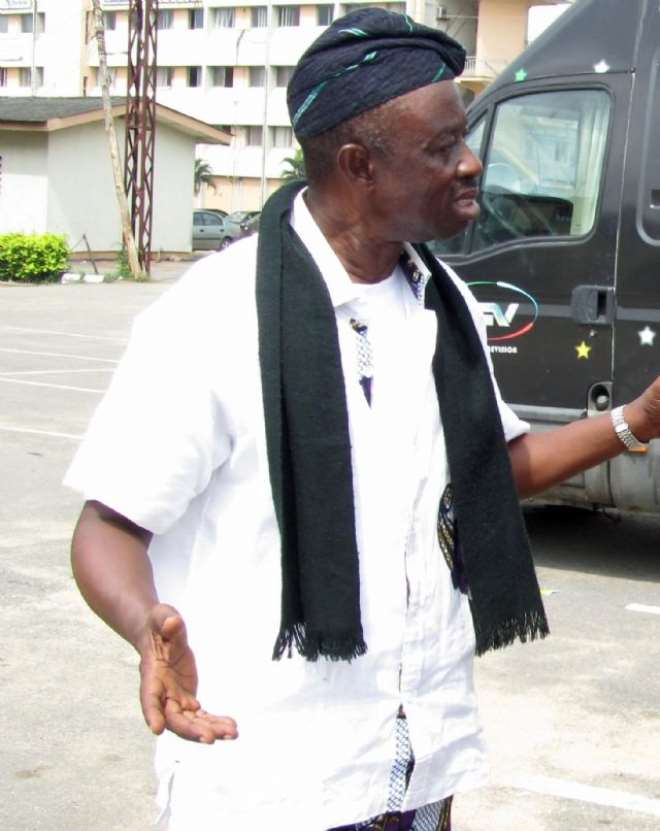I was almost forced out of Nollywood ---Tunde Kelan
The history of the success so far recorded by the Nigerian entertainment industry will never be complete without the mention of Tunde Kelani, one of the most skilled veteran film producers Nigeria has ever produced.
A native of Abeokuta, in Ogun State, but born in Lagos, Tunde's passion for entertainment has catapulted him to the pinnacle of success he has enjoyed in his chosen career.
Raised without the proverbial golden spoon, the now successful director of Mainframe Production, an internationally recognised film production outfit, has carved a niche for himself.
A 1978 graduate of the London Film School, Tunde has produced numerous award-winning films, among which is Ti Oluwa ni Ile, Thunderbolt, SaworoIde, O Le ku, Campus Queen and Arugba, among others.
Tunde had worked with past great Nigerian artists like Ulli Beier and film producers like, Hubert Ogunde.
However, despite successes recorded in his career, not many people knew that TK, as he is fondly called, would have abandoned the profession that brought him fame three years ago.
His frustration stemmed from the release of Arugba, which was produced three years ago. There were high expectations by him that the film would bring him lots of money but that was not to be, as pirates feasted on it, throwing him into debt, running into millions of naira.
“I had thought of calling it quits with the profession because of the issue of piracy. We were 22 people that started Mainframe Productions but now, only three of us are left. Others left because of what pirates are doing to the industry. When you produce films, pirates will not allow you to make your money. We spent about N20 million to produce Arugba but because of piracy, we lost all the money. We did not make any profit on it. They (pirates) really dealt with us,” he said.
As a Yoruba man, his passion for Yoruba language is evident in most films he has produced, which were always in Yoruba language. This made him more acceptable in the Yoruba genre of the movie industry.
While growing up, he trained as a photographer. With experience garnered over the years, he has successfully produced high quality technical films.
His attempt to venture into the English language movies with the production of Thunderbolt, Campus Queen and The Narrow Path, has not yielded much positive result because of what he called, 'sabotage' by the film marketers.
Latest work
We having been working on a new film called, Ma'ami since August, 2010. We tried to have a turn around time but due to finances, it was not possible to release it in time. In the next two weeks, we will round off the production.
It will be premiered in Nigeria and so far, we have spent N25 million, with the support of the Lagos State Government.
We lost money on Arugba, to piracy. We lost about N20 million. They really dealt with us. It was even pirated in London. Previously, our films had always been pirated but it had never been as bad as Arugba. I had thought of calling it quits because of this but because of the passion I have for the job, I have been able to continue.
To make sure that the new film is not like Arugba, we have decided not to release it into the market. It will be shown only at the Cinemas.
Ma'ami is the true-to-life story of a hard-struggling, hard-surviving single parent who sees sacred responsibility in raising her only child, Kashimawo. Like every responsible Yoruba mother, Ma'ami would stretch herself to educate her only child. She runs a small stall that takes the mystery out of the myth of the middle-class. Her low class status naturally makes things extremely difficult and, at times, it can be very hard to fend for the child.
Kashimawo, on the other hand, rises from obscurity to become a twinkling star, revered by his fellow countrymen, especially since plying his trade as a professional footballer at Arsenal, the most popular club in the United Kingdom. The story revolves around Kashimawo, who in the period leading to the 2010 World Cup, reminisces about his hardscrabble childhood in the southern Nigerian town of Abeokuta. The film features Funke Akindele, as the lead character.
Challenges
All my films are very challenging. Everyone of them poses a different challenge. It is like fighting for your life. You see, Nigeria is not developing. One of the problems we faced in Abeokuta while shooting the film was that there were no good roads. We had to find alternative routes. Look at the country. There was a time we had some NEPA but now, there is none left.
Most successful film
I think the film I did well with was Ti Oluwa ni Ile, but the money we made gave birth to other films because we had to re-invest. Along the line, we lost money on other films. We lost money on English films like Thunderbolt and other English films we produced.
The marketers don't like me to work on English films. They are like a cabal. I am more acceptable in the Yoruba genre because I use indigenous language in my movies more than English.
Funke Akindele
I have followed her progress. She has always been working on our films as a supportive character. She had always been playing glamorous roles but this time around, we are giving her a lead role that is not glamorous. We want to see how people will react to the film.
Controversy over Ti Oluwa Ni Ile
Whichever way a material comes, we still have to work on it. Ti Oluwa Ni Ile was a Mainframe film. At the time Baba Wande brought the script to us, it was not called Ti Oluwa ni Ile. We had to work on the technicality of it and we had an agreement with him. No doubt, the man is a very talented script writer.
Pornography in movies
I don't watch pornography but the censors board should do their work in censoring movies. Parents should also be alive to what their children watch so that they don't watch pornography in the name of watching movies.
Influx of Ghana movies into Nigeria
I don't see any danger in that, for Nollywood. There was a time Ghanaians were demanding for Nigerian movies. There must be a reason movies from Ghana are becoming popular. The audience wants good films, whether they are Nigerian or Ghanaian. If they are not good films, they won't sell. It is a challenge for producers to raise the standards of their films so that people would not need to buy Ghana movies.
Good films
A good film should have a good story and high production value. It must be up to international standards. It should also have good cast. An international film comes with high budget. The question is how we can access funds to produce films of international standards, in Nigeria. Abroad, they can produce a film with N150million. So government should provide funds.
Plans for the future
I don't have plans. I am worried about the fate of Nigeria as a nation. No jobs. Time will tell. My plans for Mainframe depend on the situation in the country.
Latest News
-
 I Don't Like Being Sprayed With Money —- Seun Kuti
I Don't Like Being Sprayed With Money —- Seun Kuti -
 “I Wouldn't Advise Myself To Be With Someone In My
“I Wouldn't Advise Myself To Be With Someone In My -
 Nollywood Actress, Etinosa Idemudia Stands With Ph
Nollywood Actress, Etinosa Idemudia Stands With Ph -
 Bobrisky Heads To Appeal Court, Challenges Six-mon
Bobrisky Heads To Appeal Court, Challenges Six-mon -
 “Sometimes, The Answers To Your Problems Lies In Y
“Sometimes, The Answers To Your Problems Lies In Y -
 “Man Of The Year" - Pretty Mike Crowns Portable
“Man Of The Year" - Pretty Mike Crowns Portable -
 Yingi Debuts "Waterside Girl EP"; A Melodic Journe
Yingi Debuts "Waterside Girl EP"; A Melodic Journe -
 Singer, Joeboy Reveals Criteria For Men To Know Tr
Singer, Joeboy Reveals Criteria For Men To Know Tr -
 “I Wish I Had Found Love Before Now– Spyro
“I Wish I Had Found Love Before Now– Spyro -
 Toyin Abraham Appreciates Funke Akindele, Barring
Toyin Abraham Appreciates Funke Akindele, Barring














